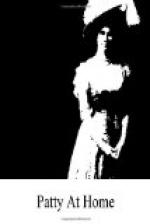Patty’s part in the play was that of Diana, and her costume was to be a beautiful one of hunter’s green cloth with russet leather leggings and a jaunty cap. Being up-to-date, instead of being a huntress she was to represent an agent of the S.P.C.A.
This suited Patty exactly, for she had a horror of killing live things, and very much preferred doing all she could to prevent such slaughter. Moreover, the humour of the thing appealed to her, and the funny effect of the huntress Diana going around distributing S.P.C.A. leaflets, and begging her fellow-Olympians not to shoot, seemed to Patty very humourous and attractive.
This Saturday, then, she had settled down in the library to study her lines all through the long cosey morning, when, to her annoyance, the doorbell rang.
“I hope it’s none of the girls,” she thought. “I did want this morning to myself.”
It wasn’t any of the girls, but Pansy announced that a messenger had come from Miss Daggett’s, and that Miss Daggett wished Miss Fairfield to return her call at once.
Patty smiled at the unusual message, but groaned at the thought of her interrupted holiday.
However, Miss Daggett was not one to be ignored or lightly set aside, so Patty put on her things and started.
Although Miss Daggett’s house was next door to Boxley Hall, yet it was set in the middle of such a large lot, and was so far back from the street, and so surrounded by tall, thick trees, that Patty had never had a really good view of it.
She was surprised, therefore, to find it a very large, old-fashioned stone house, with broad veranda and steps guarded by two stone lions.
Patty rang the bell, and the door was opened very slightly. A small, quaint-looking old coloured man peeped out.
“Go ’way,” he said, “go ’way at once! We don’t want no tickets.”
“I’m not selling tickets,” said Patty, half angry and half amused.
“Well, we don’t want no shoelacers, nor lead pencils, nor nuffin! You must be selling something.”
“I am not selling anything,” said Patty. “I came over because Miss Daggett sent for me.”
“Laws ‘a’ massy, child, why didn’t you say so before you spoke? Be you Miss Fairfield?”
“Yes,” said Patty; “here’s my card.”
“Oh, never mind the ticket; if so be you’s Miss Fairfield, jes’ come right in, come right in.”
The door was flung open wide and Patty entered a dark, old-fashioned hall. From that she was led into a parlour, so dark that she could scarcely see the outline of a lady on the sofa.
“How do you do, Miss Daggett?” she said, guessing that it was probably her hostess who seemed to be sitting there.
“How do you do?” said Miss Daggett, putting out her hand, without rising.
“I’m quite well, thank you,” said Patty, and her eyes having grown a little accustomed to the dark, she grasped the old lady’s hand, although, as she told her father afterwards, she was awfully afraid she would tweak her nose by mistake.




